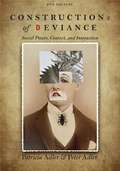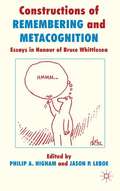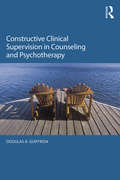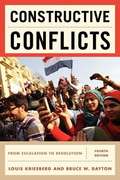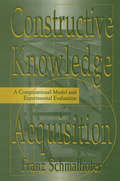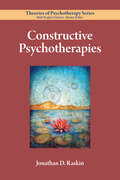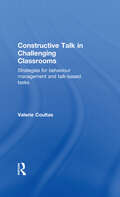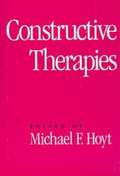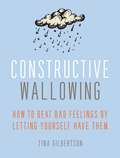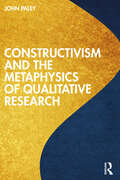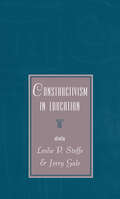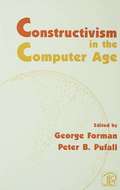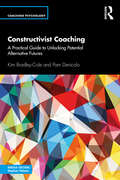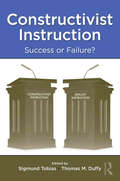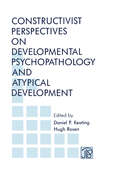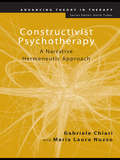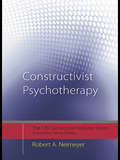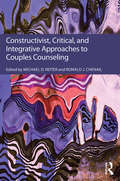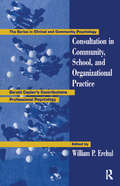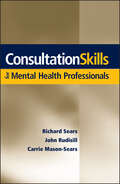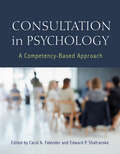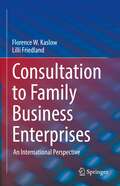- Table View
- List View
Constructions of Deviance: Social Power, Context, and Interaction 8th Edition
by Patricia A. Adler Peter AdlerPacked with the most recent and relevant articles in the field, CONSTRUCTIONS OF DEVIANCE: SOCIAL POWER, CONTEXT, AND INTERACTION, Eighth Edition, shows readers how to apply the concepts and theories of deviance to the world around them. The book's current, comprehensive coverage includes both theoretical analyses and ethnographic illustrations of how deviance is socially constructed, organized, and managed. Seasoned authors and award-winning professors, Patricia Adler and Peter Adler cover a wide variety of deviant acts-challenging readers to see the diversity and pervasiveness of deviance in society. They present deviance as a component of society, examine the construction of deviance, and explore the processes in society that create deviance. Intriguing selected studies focus on the experiences of deviants, the deviant-making process, and the ways in which people labeled as deviant in society react to that label. The balanced selection of readings is timely and engaging, while in-depth introductions, explanations of theory, and discussion questions guide readers through the fascinating material.
Constructions of Remembering and Metacognition
by Philip A. HighamContaining contributions from world leaders honouring Bruce Whittlesea's lifetime contribution to memory research, this volume reflects the current understanding amongst memory researchers that memory is more than passive acquisition and retrieval, but involves constructions, attributions, and inferences.
Constructive Clinical Supervision in Counseling and Psychotherapy
by Douglas A. GuiffridaConstructive Clinical Supervision in Counseling and Psychotherapy articulates a practical, theoretical approach to supervision that integrates salient elements of a number of diverse but complementary theoretical perspectives from the fields of human development, psychotherapy, and clinical supervision to assist in facilitating supervisee growth and change from a constructivist framework. This constructive approach to supervision is designed to serve as a practical, integrative meta-theory for supervisors of any theoretical orientation. For readers who already identify with constructivist ideas, this book will provide a theoretical grounding for their work, along with strategies to deepen their clinical practice. For those who are new to constructivist thinking, this book offers an innovative possibility for conceptualizing their role as clinical supervisors and alternative interventions to consider during times of impasse.
Constructive Conflicts: From Escalation to Resolution
by Louis Kriesberg Bruce W. DaytonWith a framework for analysing diverse social conflicts, this book covers all aspects of a conflict right from how they are waged, involvement of social media and how to foster constructive ways to resolve them.
Constructive Controversy
by David W. JohnsonWhy do people make decisions based on their own perspective without considering alternative points of view? Do differences of opinion enhance or obstruct critical thinking? Is it wise to seek out people who disagree with you and listen to their objections to your conclusions? Focusing on the theory, research, and application of constructive controversy, this book analyses the nature of disagreement among members of decision-making groups, project teams, academic study groups, and other groups that are involved in solving problems. Johnson demonstrates that this theory is one of the most effective methods of enhancing creativity and innovation, decision making, teaching, and political discourse. The book includes entertaining and intriguing examples of how constructive controversy has been used in a variety of historical periods to advance creativity, achieve innovations, and guide democracies. It will be welcomed by students in the fields of social psychology, management/business studies, education, and communication studies.
Constructive Knowledge Acquisition: A Computational Model and Experimental Evaluation
by Franz SchmalhoferA cognitive psychology which becomes increasingly specialized requires a special effort in order to avoid a fragmentation into several controversial issues that are independently discussed but also inherently related. Rather than asking additional differentiated questions which are then investigated by more specialized experimental methods and designs, this book promotes unified theories and a levels approach for their experimental evaluation. Within this cognitive science approach and on the basis of the most foundational assumptions of Kintsch's construction integration theory, a computational theory of knowledge acquisition is then developed and subsequently evaluated by psychological experiments. For forty years, computer simulation techniques and experimental psychology research have greatly matured the understanding of human knowledge and its acquisition in different learning environments. This volume critically assesses the advantages and limitations of these approaches and then develops an integrated research methodology. It goes on to provide significant progress concerning the following questions: * What are the most promising research methodologies for investigating human cognition? * How can the experimental psychology research on text comprehension, concept formation, and memory become more closely related to one another when the very specialized research paradigms and the highly specific scientific controversies promote their separation and independent discussion? * How can a general comprehension-based theory bridge the gap between simple experimental settings and the real-life situations that occur in education and work environments? This book demonstrates how experimental psychology can proceed more successfully by investigating those aspects that are shared among different areas of research like text comprehension, categorization, and learning by exploration. It also shows how unified theories can assist in applying experimental psychology and cognitive science results to areas such as intelligent tutoring systems, instructional design, and the development of expert systems in complex real world domains.
Constructive Psychotherapies (Theories of Psychotherapy Series®)
by Jonathan D. RaskinThis book examines the history, theory, practice, and empirical evidence for constructive psychotherapy. Human beings exist within a context that is constructed by our language, worldview, and the stories we tell. Alone and in concert with one another, we construct meaningful understandings of the world. Because the invented nature of our reality is so often forgotten or overlooked, we can easily find ourselves trapped in prisons of our own making. Constructive theories are therefore useful to psychotherapists, who work with clients at the intersection between constructed meaning and experiential reality. Constructive therapies enable therapists to disrupt and reinterpret the meanings clients assign to their experience, and then initiate reconstruction processes that can open clients up to new possibilities. Chapters in this volume describe the history and theory of constructivism and constructive psychotherapy, examine the key therapeutic aims and techniques of constructive therapy, provide a nuts-and-bolts description of the therapy process, and summarize the empirical evidence for the effectiveness of this therapy.
Constructive Talk in Challenging Classrooms: Strategies for Behaviour Management and Talk-Based Tasks
by Valerie CoultasConstructive Talk in Challenging Classrooms gives the practising teacher advice on how to make learning fun through the use of ‘talk’ and collaborative group work. Using clear examples, tried and tested in some of the most challenging classrooms in inner city schools, the book offers practical and honest advice on both the difficulties and rewards that can be gained when employing all forms of talk-based teaching in the classroom. Packed with real examples of successful talk based lessons with children of all abilities and needs, this book will show teachers how they can succeed in overcoming problems of disruption and engage even the most difficult pupils in real learning through talk. The book shows that bringing the child's individual experience into a lesson through talk has huge emotional and psychological benefits – this can be particularly marked in classrooms where there are low levels of literacy, behaviour issues or where pupils’ first language is not English. The author argues that talk is vital for building positive relationships and essential for successful teaching, particularly in the difficult classrooms. This inspiring title is essential reading for any teacher interested in building trust and making learning fun and meaningful for all.
Constructive Therapies: Volume 1
by Michael F. HoytThis engaging book presents a range of creative, time-effective approaches for helping clients build on their competencies and develop their own solutions. In-depth interviews with Michael White, Steve de Shazer, Bill O'Hanlon, Donald Meichenbaum, and Kenneth Gergen are incorporated with other clinically oriented chapters from well-known therapists. Topics covered include different styles of constructive therapy, the externalization and deconstruction of problems, narrative work with ADHD-diagnosed children, a solution-focused approach for dealing with cases of domestic violence, EMDR and the MRI interactional approach, actualizing the empty self in psychotherapy, emotional and spiritual healing, and more. Illustrative case examples are featured throughout.
Constructive Wallowing
by Tina Gilbertson"Constructive wallowing" seems like an oxymoron. Constructive is a good thing, but wallowing is bad.Right?But wait a minute; is it really so terrible to give ourselves a time-out to feel our feelings? Or is it possible that wallowing is an act of loving kindness, right when we need it most?Just about everyone loves the idea of self-compassion -- the notion that maybe in spite of our messy emotions and questionable behavior, we really aren't all that bad. In recent years there's been an explosion of books that encourage readers to stop beating themselves up for being human, which is terrific. Unfortunately, readers who aren't interested in Buddhism or meditation have been left out in the cold. Self-compassion is an everyday habit that everyone can learn, even if they a) aren't particularly spiritual, b) find most books about self-compassion too serious, or else c) have already overdosed on meditation.Constructive Wallowing: How to Beat Bad Feelings by Letting Yourself Have Them is the first book to cut right to the chase, bypassing descriptions of Eastern philosophy and meditation techniques to teach readers exactly how to accept and feel their feelings with self-compassion for greater emotional health and well-being ... while making them laugh from time to time.It seems that the wisdom of "keeping your friends close and your enemies closer" applies to emotions as well as people. It's tempting to turn away from menacing, uncomfortable feelings like anger, grief or regret and treat them like unwanted guests; however, ignoring them just seems to make them stick around. They lurk in the background like punks with switchblades, waiting to pounce as soon as they see an opening.By learning to accept and embrace, rather than suppress, difficult feelings, people can keep their sense of personal power and, better yet, gain greater understanding and ultimately esteem for themselves. Feeling bad can actually lead to feeling better, faster!
Constructive Wallowing: How to Beat Bad Feelings by Letting Yourself Have Them
by Tina Gilbertson"Constructive wallowing" seems like an oxymoron. Constructive is a good thing, but wallowing is bad. Right? But wait a minute; is it really so terrible to give ourselves a time-out to feel our feelings? Or is it possible that wallowing is an act of loving kindness, right when we need it most? Just about everyone loves the idea of self-compassion -- the notion that maybe in spite of our messy emotions and questionable behavior, we really aren't all that bad. In recent years there's been an explosion of books that encourage readers to stop beating themselves up for being human, which is terrific. Unfortunately, readers who aren't interested in Buddhism or meditation have been left out in the cold. Self-compassion is an everyday habit that everyone can learn, even if they a) aren't particularly spiritual, b) find most books about self-compassion too serious, or else c) have already overdosed on meditation. Constructive Wallowing: How to Beat Bad Feelings by Letting Yourself Have Them is the first book to cut right to the chase, bypassing descriptions of Eastern philosophy and meditation techniques to teach readers exactly how to accept and feel their feelings with self-compassion for greater emotional health and well-being ... while making them laugh from time to time. It seems that the wisdom of "keeping your friends close and your enemies closer" applies to emotions as well as people. It's tempting to turn away from menacing, uncomfortable feelings like anger, grief or regret and treat them like unwanted guests; however, ignoring them just seems to make them stick around. They lurk in the background like punks with switchblades, waiting to pounce as soon as they see an opening. By learning to accept and embrace, rather than suppress, difficult feelings, people can keep their sense of personal power and, better yet, gain greater understanding and ultimately esteem for themselves. Feeling bad can actually lead to feeling better, faster!
Constructivism and the Metaphysics of Qualitative Research
by John PaleyThis book challenges the widespread assumption that a necessary preliminary to qualitative research is the formulation of ontological and epistemological beliefs. It argues that the metaphysical claims which supposedly underpin different approaches to social research do not make sense. Literally. Sentences such as ‘There is a single objective reality’ and ‘There are multiple constructed realities’ fail to make information-providing statements. They do not refer or describe. Despite appearances, they say nothing about reality (or realities) at a fundamental level, so they cannot be used to justify, ground, or align with, methodological decisions. The ‘necessary preliminary’ turns out not to be necessary at all; and we can dispense with, not just ‘paradigms’, but metaphysical underpinnings in general, whether structured as paradigms or not.Drawing on Wittgenstein’s later philosophy, Carnap’s metametaphysics, and contemporary linguistics, the book suggests that the metaphysical claims of qualitative texts can be reinterpreted as performative. Ontological and epistemological beliefs are resolutions and proposals, recommendations for the use of language. They form part of a creed by means of which researchers enact the joining of an academic community. Written in Paley’s trademark clear, accessible and conversational style, the book points to a revolution in our understanding of the relation between metaphysics and social research. It will be essential reading for anyone interested in qualitative research and its philosophical foundations.
Constructivism in Education: Building On The Pioneering Work Of Ernst Von Glasersfeld (Studies In Mathematics Education Ser.)
by Leslie P. Steffe Jerry GaleUnique in offering a multidisciplinary perspective on key issues of alternative epistemologies in education, this collection includes contributions from scholars in family therapy, epistemology, and mathematics, science, and language education. These respected researchers were brought together to develop the theme of constructivism as it applies to many diversified fields. This book examines key distinctions of various constructivist epistemologies, comparing and contrasting the various paradigms. Each section provides both keynote positions on a particular alternative paradigm as well as critical comments by respondents regarding that position. Several chapters also present a synthesis of the alternative epistemological perspectives.
Constructivism in the Computer Age (Jean Piaget Symposia Series)
by George Forman Peter B. PufallDiscussing the future value of computers as tools for cognitive development, the volume reviews past literature and presents new data from a Piagetian perspective. Constructivism in the Computer Age includes such topics as: teaching LOGO to children; the computers effects on social development; computer graphics as a new language; and computers as a means of enhancing reflective thinking.
Constructivist Coaching: A Practical Guide to Unlocking Potential Alternative Futures (Coaching Psychology)
by Pam Denicolo Kim Bradley-ColeBased on the philosophy of Personal Construct Psychology (PCP), Constructivist Coaching PCP is interested in how people interpret their own lives and how they ‘construct’ their sense of reality within their social world. Relationships, social context, individual thought processes, identity, and active learning are all fundamental aspects of this approach. Using a range of methods and practical applications, these expert authors bring constructivist coaching to life for the first time, enabling the reader to quickly grasp both the meaning of the approach and how to apply it. The aim is to work flexibly with your coachees, allowing them to lead the coaching process to unlock what they did not know or realise about themselves and reach greater self-understanding and self-acceptance, and to enable them to engage in meaningful change. With a wide range of examples offered, the methods covered in the book can be used flexibly across contexts, as either a holistic coaching philosophy or an extension to your existing coaching tools. Constructivist Coaching is an invaluable practical guide for coaches, managers and occupational psychologists, along with anyone else who is involved in supporting the personal development and learning of others.
Constructivist Instruction: Success or Failure?
by Sigmund Tobias Thomas M. DuffyConstructivist Instruction: Success or Failure? brings together leading thinkers from both sides of the hotly debated controversy about constructivist approaches to instruction. Although constructivist theories and practice now dominate the fields of the learning sciences, instructional technology, curriculum and teaching, and educational psychology, they have also been the subject of sharp criticism regarding sparse research support and adverse research findings. This volume presents: the evidence for and against constructivism; the challenges from information-processing theorists; and commentaries from leading researchers in areas such as text comprehension, technology, as well as math and science education, who discuss the constructivist framework from their perspectives. Chapters present detailed views from both sides of the controversy. A distinctive feature of the book is the dialogue built into it between the different positions. Each chapter concludes with discussions in which two authors with opposing views raise questions about the chapter, followed by the author(s)’ responses to those questions; for some chapters there are several cycles of questions and answers. These discussions, and concluding chapters by the editors, clarify, and occasionally narrow the differences between positions and identify needed research.
Constructivist Perspectives on Developmental Psychopathology and Atypical Development (Jean Piaget Symposia Series)
by Hugh Rosen Daniel P. KeatingThis volume is the result of a symposium titled "Constructivist Approaches to Atypical Development and Developmental Psychopathology." What emerges from the work included here is a record of innovative extensions, refinements, and applications of the concept of constructivism. The chapters not only demonstrate the compatibility of constructivism with investigations of atypicality, but also the generation of a constructivist perspective for a wide array of problems in developmental psychology.
Constructivist Psychotherapy: A Narrative Hermeneutic Approach (Advancing Theory in Therapy)
by Gabriele Chiari Maria Laura NuzzoPsychotherapy has undergone major changes in recent years, with a variety of new approaches including cognitive-behavioural therapy joining the more traditional and widespread schools of thought. These new approaches all share the epistemological assumption of constructivism, which states that there are alternative ways of looking at events and that we interpret events according to how we see the world. Constructivist Psychotherapy reviews the constructivist trends in psychotherapy which link these new approaches, allowing the reader to enter an entirely new dialogue. The book traces constructivist thought, elaborating on Kelly’s personal construct theory and the implications for psychotherapeutic theory and practice. Areas of discussion include: the therapist’s understanding of the client’s narrative a constructivist understanding of the person psychological constructivism and constructivist trends in psychotherapy Setting constructivist psychotherapy within its therapeutic, social and philosophical context and using case studies throughout, the book revisits 'Kellian' ideas and theories, bringing them up to date, to explore what it is to be a constructivist psychotherapist today. As such this book will be of interest to all psychotherapists, as well as anyone with an interest in the psychotherapeutic field.
Constructivist Psychotherapy: Distinctive Features (CBT Distinctive Features)
by Robert A. NeimeyerConstructivist psychotherapy focuses on the meaning that clients attribute to their world, and the way that this shapes their life and contributes to their difficulties. In this book, Robert A. Neimeyer, a leading figure in the field, provides a clear and accessible explanation of the key features of this approach. Constructivist Psychotherapy: Distinctive Features concentrates on the 30 key commitments that distinguish constructivism from other cognitive behavioural perspectives. Divided into two sections – Theory and Practice – this straightforward book is illustrated throughout with case material and recent research findings. Neimeyer provides us with a fresh perspective on familiar material, together with a clear, concise introduction to material that the reader may be less familiar with, making this book a valuable text for professionals in training as well as a source of new ideas for practising therapists of constructivist psychotherapy.
Constructivist, Critical, And Integrative Approaches To Couples Counseling
by Michael D. Reiter Ronald J. ChenailCouples counseling is distinct from individual and family therapy and, while ideas from these other formats may be overlapping, applying theoretical concepts to couples has distinctive challenges. Constructivist, Critical, and Integrative Approaches to Couples Counseling is unique in that it addresses how to conceptualize various theories around a single case. By discussing only one case, the reader is more readily able to compare and contrast the theoretical ideas of each theory, as well as the pragmatics of techniques. Five theories are discussed around four consistent parts: history, theory of problem formation, theory of problem resolution, and case transcript. This book follows the same format as its companion Behavioral, Humanistic-Existential, and Psychodynamic Approaches to Couples Counseling.
Construyendo puentes
by José Luis Gonzalo MarrodánLa caja de arena se encuentra entre las herramientas terapéuticas más útiles para el trabajo con niños y adultos. Como se expone a lo largo de este libro, la realización de la caja de arena permite trabajar cuando resulta difícil la verbalización de los contenidos psíquicos; y esto es especialmente importante cuando el paciente tiene dificultades para ponerlos en palabras, como ocurre habitualmente con los niños. Cuando el origen del problema es un trauma infantil, recordar y explicar es una fuente adicional de sufrimiento. Utilizar la caja de arena permite la distancia necesaria para ir elaborando la experiencia traumática sin tanto dolor. Construyendo puentes plantea que crear escenas utilizando miniaturas (representan a los seres animados e inanimados que conforman el mundo interno y externo de las personas) dentro de una caja con arena es un abordaje terapéutico. Las miniaturas son las palabras del diccionario; la caja es la gramática y, a la vez, un contenedor de la mente humana. Se aborda el abc de la aplicación de la técnica paso a paso: historia, concepto, materiales requeridos, metodologías de aplicación, cómo conducir una sesión y cuál debe ser el rol del terapeuta. La obra contiene un buen número de fotografías de cajas y narrativas construidas por niños y adultos.José Luis Gonzalo Marrodán, San Sebastián, 1967. Psicólogo y psicoterapeuta infantil y de adultos. Formado en psicoterapia infantil por el IFIV de Barcelona. Psicoterapeuta por la EFPA. Formación en EMDR (nivel II) Trabaja en consulta privada desde 1994, y desde hace doce años su campo de interés principal y su labor profesional se centran en la aplicación de la teoría del apego a la psicoterapia. Dirige el blog:www.buenostratos.com
Consultation In Community, School, And Organizational Practice: Gerald Caplan's Contributions To Professional Psychology (Clinical and Community Psychology)
by William P. ErchulOffering an historical perspective on the development of mental health consultation and community mental health, this book's intent is twofold. First, it describes and evaluates Harvard psychiatrist Gerald Caplan's innovative approach to consultation and related activities with respect to the current and future practice of clinical community, school and organizational psychology. Second, it pays tribute to Caplan whose ideas on prevention, crisis theory, support systems, community mental health, mental health consultation and collaboration and population-orientated psychiatry have influenced the practice of professional psychology and allied fields.; The text is divided into three sections: the first provides background information for the remainder of the volume; the second documents Caplan's influence on the way psychology has been applied in various settings; andthe last considers his contribution's present and past influence. The text is aimed at consultant and practising psychologists, community and school psychology graduates and professionals involved with community mental health services.
Consultation Skills for Mental Health Professionals
by John Rudisill Richard W. Sears Carrie Mason-SearsConsultation interventions are an increasingly popular alternative to clinical practice, allowing the practitioner to interact with and affect many different individuals and organizations. This type of work challenges mental health professionals, drawing on all the skills and resources they may possess, yet also offers some of the greatest rewards and opportunities for service.Filled with numerous case examples and checklists, Consultation Skills for Mental Health Professionals contains a wealth of information on this important area of practice. It provides a comprehensive source for working with a diverse clientele in a variety of settings, discussing both traditional mental health consultation models and the fast-growing field of organizational consulting.The guide is divided into four parts:Individual-Level Consulting Issues takes up individual career assessment and counseling, along with how organizational contexts affect individual jobs; leadership, management, and supervision; executive assessment, selection, interviewing, and development; and executive coaching.Consulting to Small Systems discusses working with teams and groups; planning and conducting training and teambuilding; diversity in the workplace and in consultation.Consulting to Large Systems covers how to work with large organizations, including organizational structure, terms, culture, and concepts, as well as processes such as change and resistance; how to assess organizations, and the characteristics of healthy and dysfunctional workplaces; and issues involved in organizational intervention.Special Consulting Topics include issues such as the practical aspects of running a consulting practice; the skills required for successful clinical consultation; consultation services for special populations; and crisis consultation, including critical incident stress management, psychological first aid, disaster recovery, media communication, and school crisis response.
Consultation in Psychology: A Competency-Based Approach
by Carol A. Falender Edward P. ShafranskeIncreasingly, psychologists are being enlisted to provide consultation in clinical, health, corporate, and community settings, although many have received only minimal training in consultation. This volume provides a comprehensive foundation to develop or enhance consultation practice. Consultation is a distinct professional practice with goals and functions different from direct clinical service or clinical supervision. While all consultation settings require certain basic competencies, each setting requires additional unique ones. Thus, the opening chapters of this book introduce a competency-based, multicultural, and ethical approach to consultation that is relevant to all contexts, while subsequent chapters build on this foundation and describe the knowledge, skills, and attitudes necessary for consultation in a variety of specific contexts. These include medical, pediatric, forensic, school, corporate, leadership, family, religious, police, and military settings. Both students and practicing psychologists will benefit from this essential guide.
Consultation to Family Business Enterprises: An International Perspective
by Florence W. Kaslow Lilli FriedlandWhile family businesses have existed for millennia all over the world, it is only in the past few decades that professional consultants have been utilized to help them function more effectively. This engaging, up to the minute volume explores the varied and complex world of family enterprises as they now exist in the third decade of the 21st century. Attention is given to the factors unique to family businesses in their attention to perpetuating family values, traditions, loyalties and their legacy to future generations. Consultants may be drawn from law, finance and accounting, organizational psychology, or family psychology (with its special emphasis on understanding the family relationship system). The book describes methods of assessment and how to effectively communicate the results as well as techniques of consulting and provides an invaluable description of what is necessary to be and become a family business consultant. Readers will benefit from explorations ofA new model featuring 8 inter-related business domains Cybersecurity issues and how to handle themWorking collaboratively with financial and legal professionalsComprehensive coverage of research based assessment instrumentsGiven that over 85% of the businesses in the world, from small to multinational in size and scope are family businesses, the enormous amount of information conveyed in this volume can be extremely valuable to professional consultants and those in the C Suite (CEO’s, CFO’s, COO’s) in helping businesses operate at maximum efficiency, productivity, profitability and satisfaction to all involved."Throughout this well organized and well written book, the authors raise the pivotal questions that form the basis for becoming and being an exceptional family business consultant. Psychologists can learn to transform family business conundrums into healthy interactions between the family members of the enterprise before, during, and after transitions of the company. The various aspects of serving as a consultant are fleshed out in the carefully-researched chapters. Case studies show the patterns of behavior that can lead to continuing multigenerational successes or hard dissolutions. Their new model entitled “The Dynamic Interactive Multifactorial Family Enterprise Ecosystem Model” constitutes a major contribution to the field. The best part of the book remains its celebration of the importance and richness of family businesses across generations that will inspire any reader."G. Andrew H. Benjamin, JD, PhD, ABPPPast President, American Academy of Couple & Family PsychologyPast President, American Board (ABPP) of Couple & Family Psychology Clinical Professor of Psychology & Affiliate Professor of Law, University of Washington
